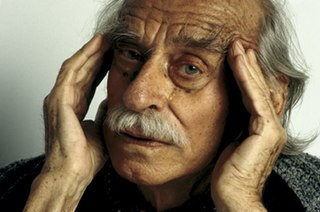A Quote by Cornel West
I'm a Christian, but I'm not a puritan. I believe in pleasure and orgiastic pleasure has its place, intellectual pleasure has its place, social pleasure has its place, televisual pleasure has its place [in life].
Quote Topics
Related Quotes
When you're comfortable and secure, it's not enough. The mind doesn't stop there because it has to continue to focus itself as this body, so it moves to pleasure. And pleasure really is a non-existent thing. When we're experiencing pleasure, we're trying to hold onto it as it leaves, so it really isn't pleasure. Pleasure is pain because we're grasping.
At the heart of our desires is eternal happiness without the slightest hint of misery. You could say that we are pleasure seekers; however, seeking pleasure from the objects of our five senses produces fleeting moments of pleasure whereas, pleasure of one's self, a soul, is eternal and ever-increasing pleasure.
There are three sorts of pleasures which are advantageous, and three which are injurious. Finding pleasure in the discriminating study of ceremonies and music, finding pleasure in discussing the good points in the conduct of others, and finding pleasure in having many wise friends, these are advantageous. But finding pleasure in profligate enjoyments, finding pleasure in idle gadding about, and finding pleasure in feasting, these are injurious.
Pleasure is not the goal of man, but knowledge. Pleasure and happiness comes to an end. It is a mistake to suppose that pleasure is the goal. The cause of all the miseries we have in the world is that men foolishly think pleasure to be the ideal to strive for. After a time man finds that it is not happiness, but knowledge, towards which he is going, and that both pleasure and pain are great teachers.
A different kind of pleasure surfaced in the aftermath, the pleasure of seeing the towers fall time and again, the experience of being entranced by the visual spectacle, and then also the very graphic forms of public mourning for exemplary citizens (taking place at the same time as the refusal to mourn the undocumented, the foreign, gay and lesbian lives lost there, for example). I am not sure that the guilt over the pleasure re-installed the good citizen.
It is pleasure that lurks in the practice of every one of your virtues. Man performs actions because they are good for him, and when they are good for other people as well they are thought virtuous: if he finds pleasure in helping others he is benevolent; if he finds pleasure in working for society he is public-spirited; but it is for your private pleasure that you give twopence to a beggar as much as it is for my private pleasure that I drink another whiskey and soda. I, less of a humbug than you, neither applaud myself for my pleasure nor demand your admiration.
Christianity cannot erase man's need for pleasure, nor can it eradicate the various sources of pleasure. What it can do, however, and what it has been extremely effective in accomplishing, is to inculcate guilt in connection with pleasure. The pursuit of pleasure, when accompanied by guilt, becomes a means of perpetuating chronic guilt, and this serves to reinforce one's dependence on God.
Lenten practices of giving up pleasures are good reminders that the purpose of life is not pleasure. The purpose of life is to attain to perfect life, all truth and undying ecstatic love - which is the definition of God. In pursuing that goal we find happiness. Pleasure is not the purpose of anything; pleasure is a by-product resulting from doing something that is good. One of the best ways to get happiness and pleasure out of life is to ask ourselves, 'How can I please God?' and, 'Why am I not better?' It is the pleasure-seeker who is bored, for all pleasures diminish with repetition.





































